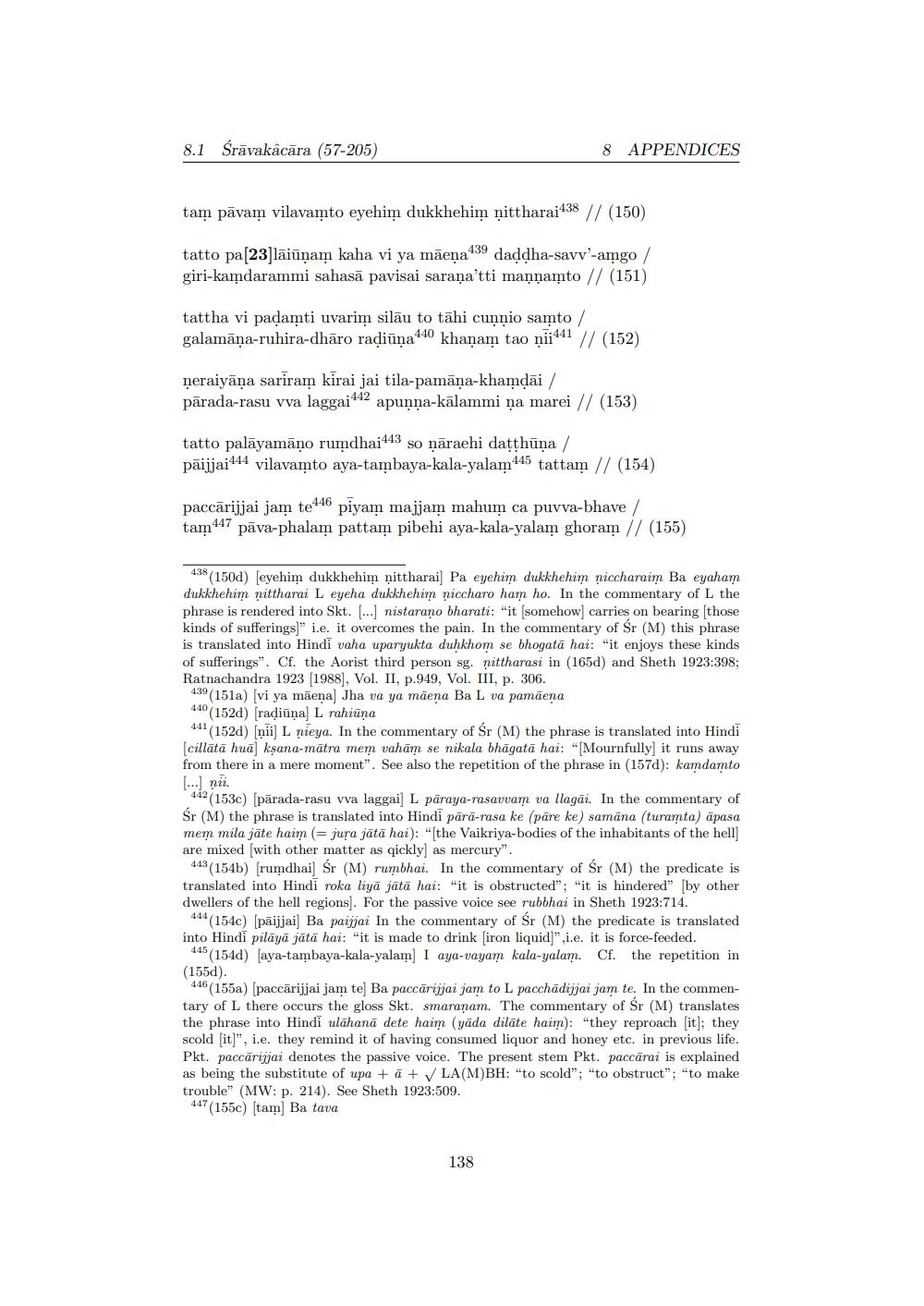________________
8.1 Śrāvakácāra (57-205)
8 APPENDICES
tam pāvam vilavamto eyehim dukkhehim nittharai438 // (150)
tatto pa[23]lāiūņam kaha vi ya māena439 daddha-savv'-amgo / giri-kamdarammi sahasā pavisai sarana'tti mannamto // (151)
tattha vi padamti uvarim silāu to tāhi cunnio samto / galamāņa-ruhira-dhāro radiūņa440 khanam tao nii441 // (152)
neraiyāņa sariram kirai jai tila-pamāna-khamdāi/ pārada-rasu vva laggai142 apunna-kālammi na marei // (153)
tatto palāyamāņo rumdhai443 so nāraehi datthūņa / pāijjai444 vilavamto aya-tambaya-kala-yalam 445 tattam // (154)
paccārijjai jam te446 piyam majjam mahum ca puvva-bhave/ tam447 pāva-phalam pattam pibehi aya-kala-yalam ghoram // (155)
438 (150d) eyehim dukkhehim nittharai) Pa eyehim dukkhehim niccharaim Ba eyaham dukkhehim nittharai L eyeha dukkhehim niccharo ham ho. In the commentary of L the phrase is rendered into Skt. [...] nistarano bharati: "it (somehow carries on bearing those kinds of sufferings)" i.e. it overcomes the pain. In the commentary of Śr (M) this phrase is translated into Hindi vaha uparyukta duhkhom se bhogata hai: "it enjoys these kinds of sufferings". Cf. the Aorist third person sg. nittharasi in (165d) and Sheth 1923:398; Ratnachandra 1923 [1988], Vol. II, p.949, Vol. III, p. 306.
439 (151a) (vi ya māenal Jha va ya māena Ba L va pamāena 440 (152d) [radiūņa] L rahiūna 441 (152d) nii) L nieya. In the commentary of Sr (M) the phrase is translated into Hindi (cillātā huā] ksana-mātra mem vahām se nikala bhāgatā hai: "Mournfully) it runs away from there in a mere moment". See also the repetition of the phrase in (157d): kamdamto
412 (153c) (pärada-rasu vva laggai] L pāraya-rasavvam va llagãi. In the commentary of Śr (M) the phrase is translated into Hindi pārā-rasa ke (pāre ke) samāna turamta) apasa mem mila jāte haim (= jura jātā hai): "[the Vaikriya-bodies of the inhabitants of the hell] are mixed with other matter as qickly) as mercury".
443 (154b) rumdhai) Sr (M) rumbhai. In the commentary of Sr (M) the predicate is translated into Hindi roka liyā jātā hai: "it is obstructed"; "it is hindered" by other dwellers of the hell regions). For the passive voice see rubbhai in Sheth 1923:714.
444 (154c) pāijjai) Ba paijjai In the commentary of Sr (M) the predicate is translated into Hindi pilāyā jātā hai: "it is made to drink (iron liquid]",i.e. it is force-feeded.
4.45 (154d) aya-tambaya-kala-yalam I aya-vayam kala-yalam. Cf. the repetition in (1550).
4.46 (155a) spaccarijjai jam tel Ba paccārijjai jam to L pacchādijjai jam te. In the commentary of L there occurs the gloss Skt. smaranam. The commentary of Sr (M) translates the phrase into Hindi ulāhanā dete haim (yāda dilate haim): "they reproach [it]: they scold [it]", i.e. they remind it of having consumed liquor and honey etc. in previous life. Pkt. paccārijjai denotes the passive voice. The present stem Pkt. paccarai is explained as being the substitute of upa + a + LA(M)BH: "to scold"; "to obstruct"; "to make trouble" (MW: p. 214). See Sheth 1923:509. 447 (1550) (tam Ba tava
138




